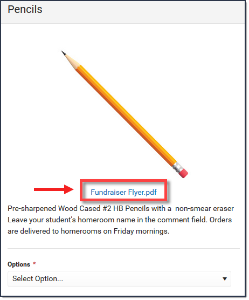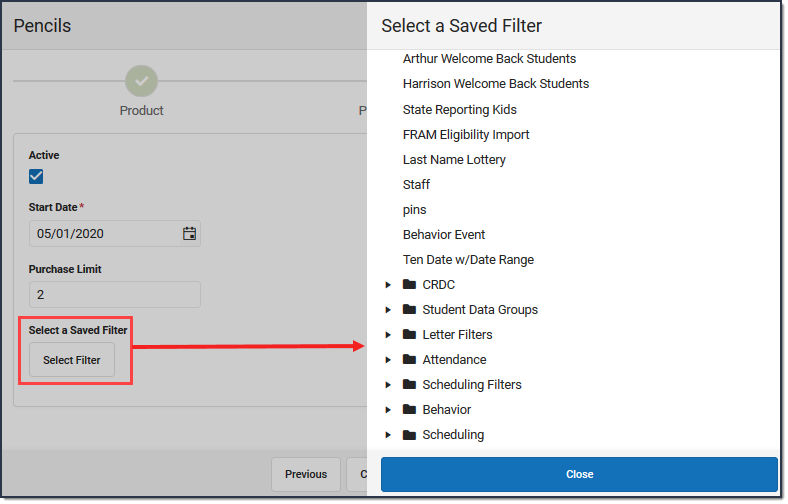Tool Search: General Product
After Categories are set up, Products can be created using the Product progress tracker. The Product progress tracker includes the following three parts:
- 1 - Product
- 2 - Product Items
- 3 - Availability
To get started, select All Schools or a specific school in the Campus toolbar, then click the Products button on a Category. If you set the Show Inactive toggle to ON, inactive Categories also display. Otherwise, when the toggle is set to OFF, only active Categories display.
If you create a Product and decide you do not want it, you can delete the Product if it has never been purchased.
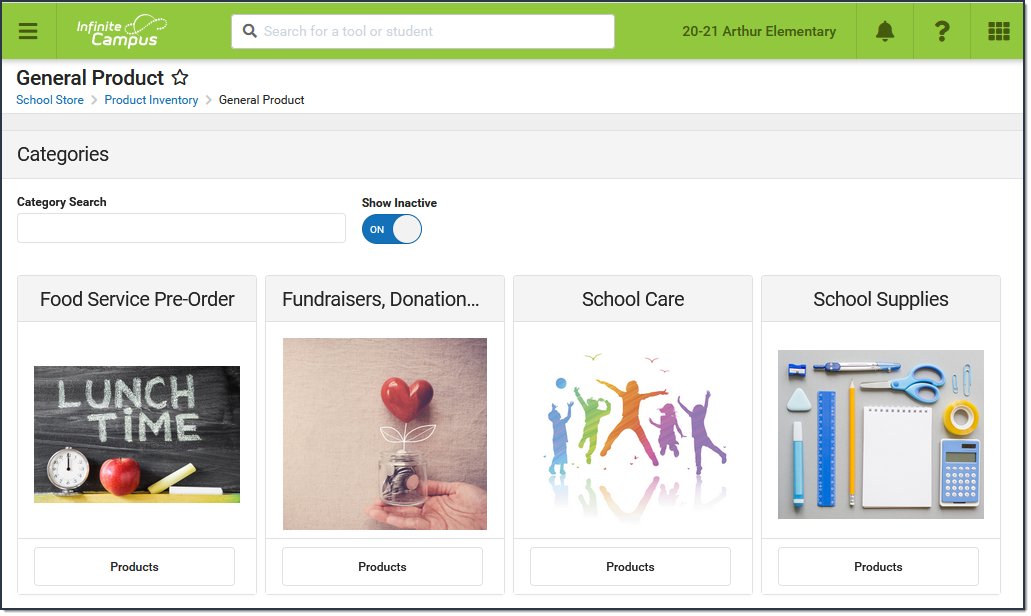
1 - Product
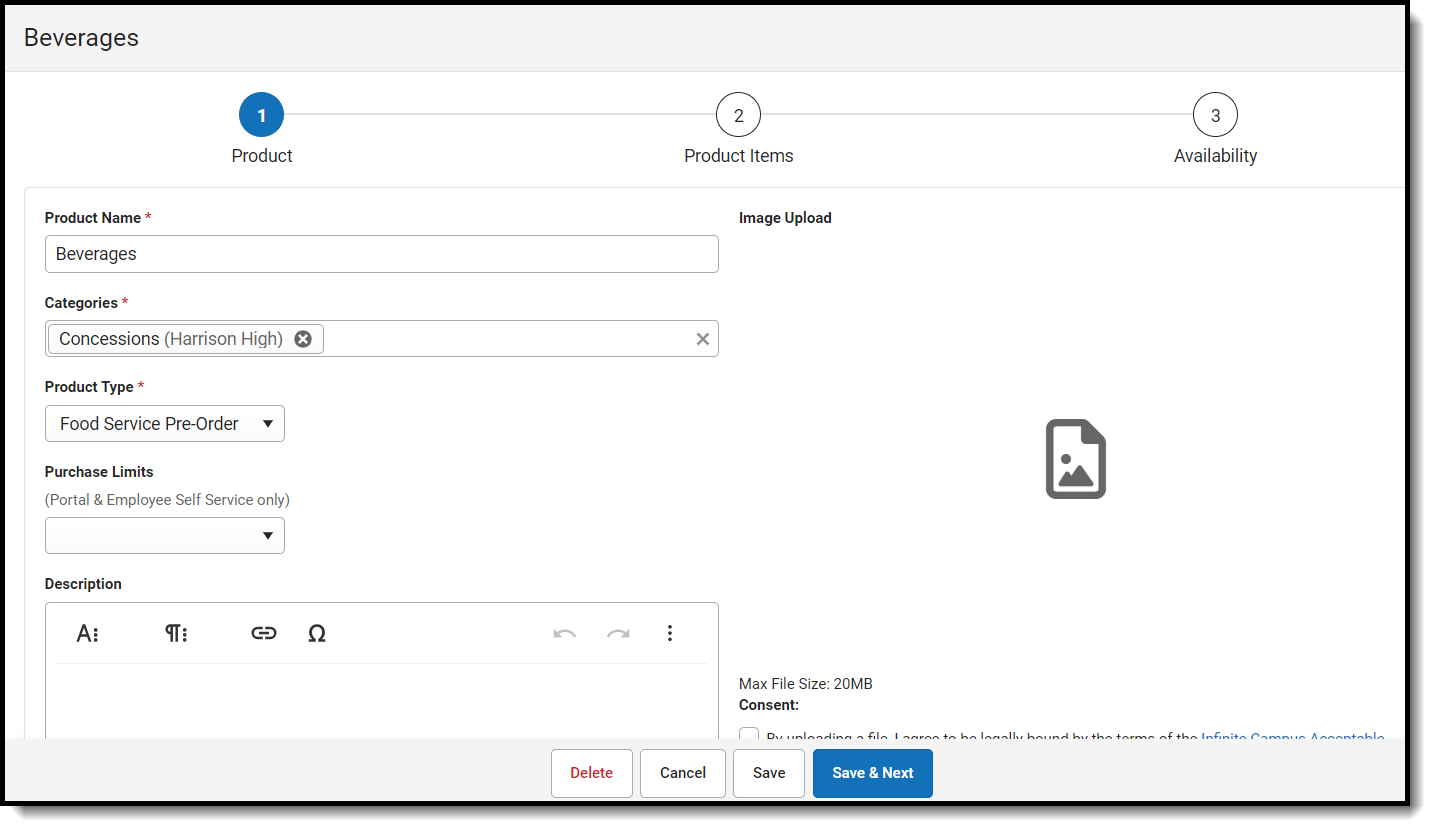
| Field | Description |
|---|---|
| Product Name | The name that displays in the School Store, Public Store, Employee Self Service, and/or Campus Mobile Payments. |
| Categories |
The Categories under which you want the Product to appear. You can select multiple Categories.
When you select a Category in School Store, Public Store, Employee Self Service, and/or Campus Mobile Payments, the assigned Products display.
The Products and Items associated with the Category are available for selection when setting up the Event Layout in School Store > Administration > Events.
The Product Category is a required field on the Orders Report. If you remove a school from a Category, you will not be able to use the Orders Report for purchases made for that combination of Category and School. |
| Product Type |
The Product Type to which you want to assign the Product. When this product is purchased, funds are deposited into the bank associated with the Product Type's Fund Account. |
| Purchase Limits |
Purchase Limits restrict the number of products or product items that can be bought for an individual recipient.
Purchase Limits can only be used in Parent Portal, Student Portal, and Employee Self Service. |
| Description | Detailed information about the product. This Description appears below the picture of the product. |
| Receipt Comments | This field allows for comments or special instructions to be added to a customer's receipt when the product is purchased. Comments appear below the purchased item.
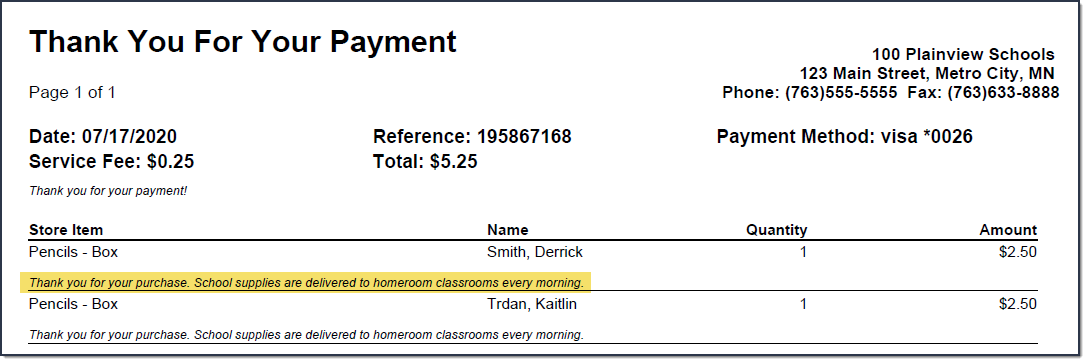 |
| Variable Rate | Mark this checkbox if you do not want to set a specific price for the item. When this checkbox is marked, the customer can enter any amount they want when they check out. This option is useful for things like donations. |
| Partial Refund | Mark this checkbox if you want to allow partial refunds for this item. |
| Inventory Tracking |
When this checkbox is marked, Campus calculates the amount of inventory you have available after a purchase is made. An additional column called Inventory on Hand displays on the Step 2 Attributes screen and allows you to manage the items in your store. If the number in this column is zero, Campus displays the message Out of Stock when the users try to add the item to their cart. Do NOT mark this option if
When this checkbox is marked, the product is included in the Inventory on Hand report. If you use the Payments Reporter to issue refunds for products purchased in the School Store and this checkbox is marked, Campus allows you to choose whether you want to return the item to Inventory on Hand. |
| Customer Comments |
When this checkbox is marked, customers can add information to their purchase before they check out. Comments appear on the Pick List report. You may enter text in the customer comment field to automatically display a message.
Customer Comments are not available in the Campus Mobile Payments app. |
| Description | Detailed information about the product. This Description appears below the picture of the product. |
| Image Upload | This option allows you to add a picture of the product.
The image must use one of the following extensions: .jpg, .jpeg, .png, or .gif. As a best practice, the file should not exceed 3MB. The image that displays in the store is a square, so a 1:1 aspect ratio is also recommended.
The uploaded images do not display in the Campus Mobile Payments app. |
| Image Description | After you select an image, an Image Description field appears. Use this field to enter a short text description of the image to be read aloud by screen readers, helping users with visual impairments understand what the image shows. |
| File Upload |
This option allows you to add a PDF file to the product. For example, pencils are going to be sold at a fundraiser, so a flyer about the fundraiser can be uploaded to the Pencils product.
A link to the PDF file displays between the image and the description.
The uploaded files do not display in the Campus Mobile Payments app. |
2 - Product Items
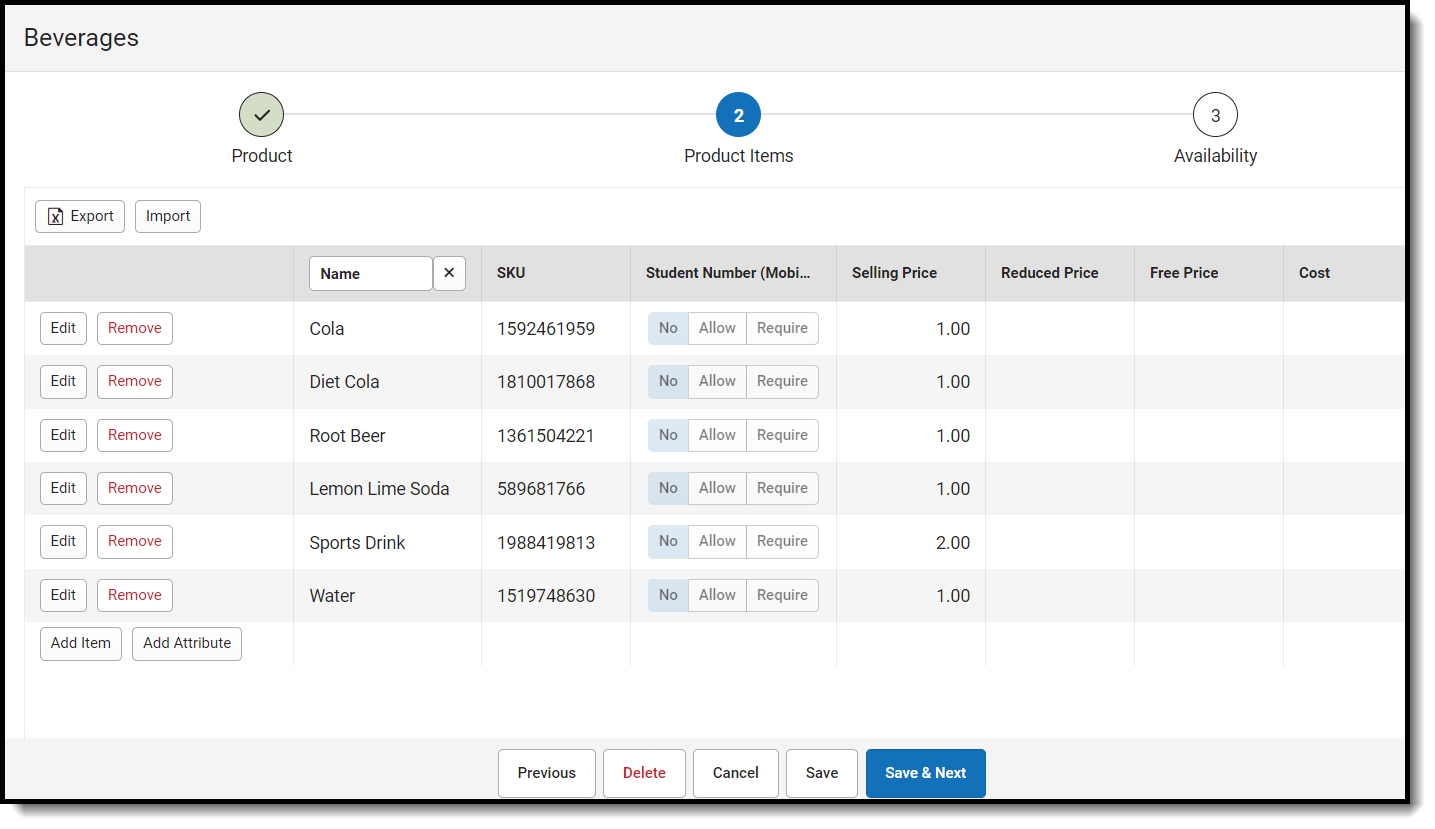
You can drag and drop rows to easily reorder lines in the table. To add multiple attributes (lines and rows) to the table, you must first click the Add Attribute button.
| Field | Description |
|---|---|
| Export | The Export button allows you to download an Excel version of the Product Items table. |
| Import |
The Import button allows you to upload an Excel or CSV file to populate the Product Items table.
To begin, use the Export button to download a template of the Product Items table.
|
| Add Item |
The Add Item button allows you to add another row to the table if you are using custom attributes. |
| Add Attribute | The Add Attribute button allows you to add custom attributes to the table. You can add up to three custom attribute columns for tracking additional product information. |
| Student Number (Mobile) | This column displays if Mobile Payments is marked within the Category under Display On.
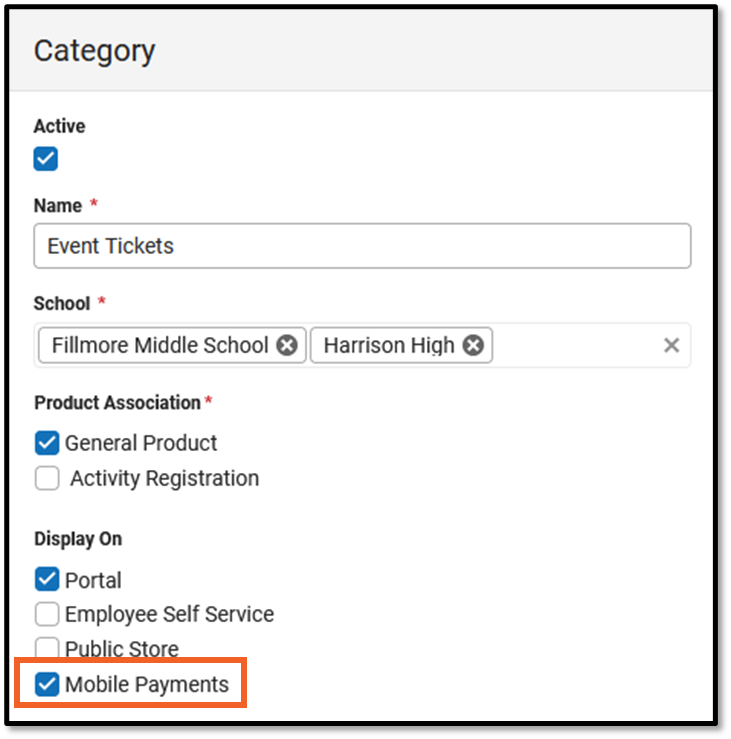 The Student Number (Mobile) field is used to track information about purchases for students. For example, if selling prom tickets, you may want to enter the student number at the time of purchase to track the students who are attending. The Student Number (Mobile) field is used to track information about purchases for students. For example, if selling prom tickets, you may want to enter the student number at the time of purchase to track the students who are attending.
When a row is added in Step 2 Product Items, the Student Number (Mobile) column displays three options:
The Student Number (Mobile) column appears in the Campus Mobile Payments app only. |
| SKU |
You can enter your own SKU or one from a vendor. If you leave this field blank, Campus assigns a unique, system generated number. Infinite Campus recommends using unique SKUs for each product. |
| Inventory on Hand |
This column only displays if Inventory Tracking is selected in Step 1 Product. This is the total amount of inventory on hand. You can manually update this number at any time. If the number in this column is zero, Campus displays the message Out of Stock when the user tries to add the item to their cart. |
| Selling Price | The price customers pay and see in the store. The price can be $0.00.
Items that cost $0 cannot be purchased through the Public Store. |
| Reduced Price |
The price students with a Reduced eligibility status whose guardians have given permission to share it with the School Store and Activity Registration pay and see in the School Store. The price can be $0.00. |
| Free Price | The price students with a Free eligibility status whose guardians have given permission to share it with the School Store and Activity Registration pay and see in the School Store. The price can be $0.00. |
| Cost | The price the district paid to purchase the product from the vendor. This field is optional. |
| Purchase Limit | This column only displays if you chose Purchase Item in the Product Limits dropdown list (Part 1 of the Product Progress Tracker). Enter the maximum number of this particular item the user is allowed to purchase for a recipient. |
3 - Availability
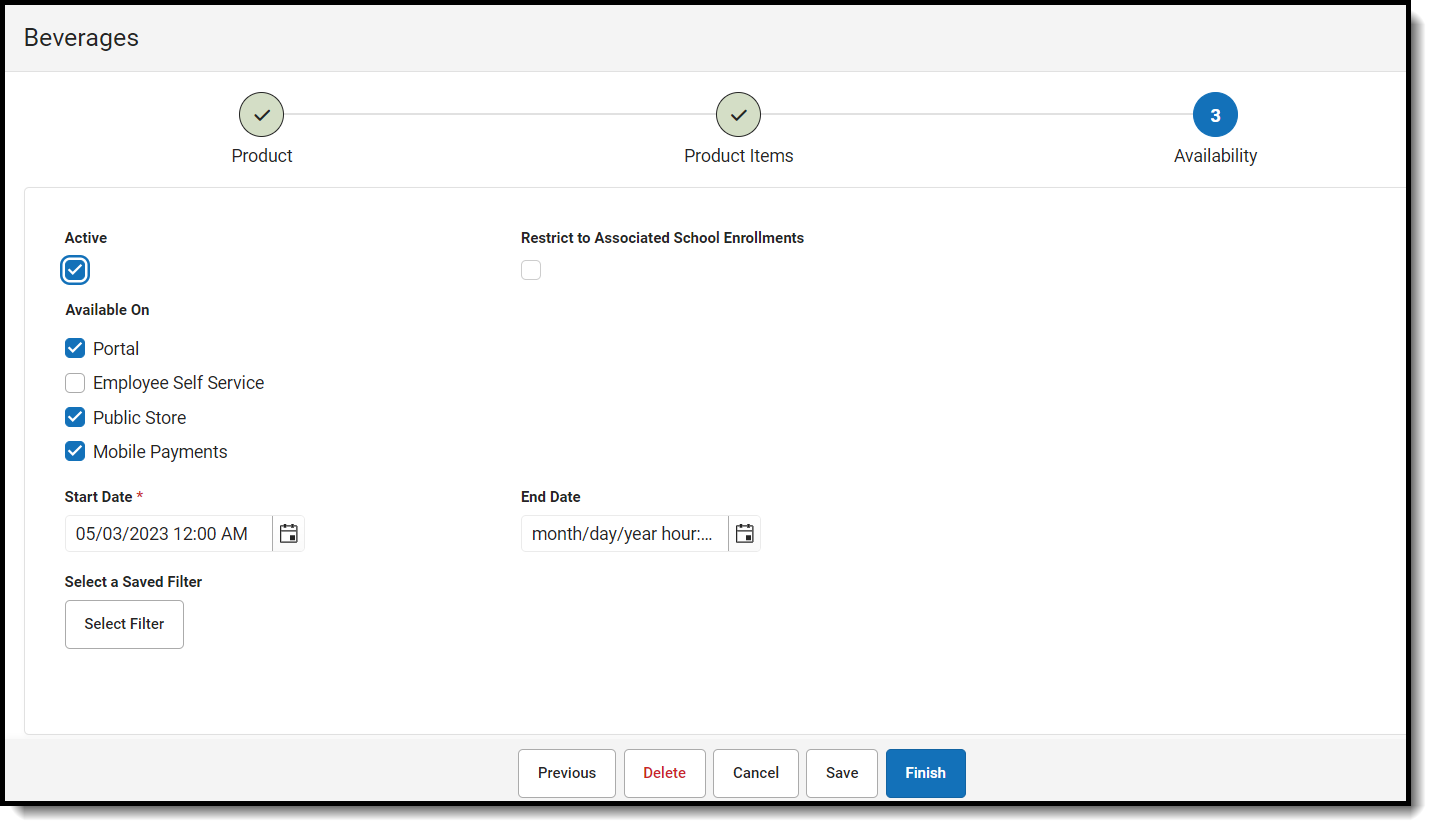
| Field | Description |
|---|---|
| Active | When this checkbox is marked, the product is available on the Start Date in the store(s) marked in the Available On section. |
| Restrict to Associated School Enrollments | When this checkbox is marked, the Recipient dropdown list in the School Store will only display students who have an enrollment in the active school year at the school to which the product is attached. This includes primary, secondary, and enrollments with a future end date.
Example If you have a Product attached to the High School only and this checkbox is marked, parents will only be able to select their student(s) with primary and secondary High School enrollments in the active school year as well as enrollments with a future end date. Please note that if the same Product is associated with multiple schools; e.g., a middle school and a high school, parents can select both middle and high school students in both stores. This option is only available when the product is only available on the Portal. If the Employee Self Service, Public Store, or Mobile Payments checkboxes are also selected, this field is disabled. |
| Include Future Enrollment | When Restrict to Associated School Enrollments has been selected, allows future enrolled students to purchase the item. If selected, the Days Before Enrollment field will appear. This allows users to set the number of days before the enrollment start date the product will be available for purchase. The maximum number of days is 365. |
| Available On |
|
| Start Date |
The first day and time on which the product may be purchased. This field is required. Campus verifies the Product Type and Category are active on the same day or prior. |
| End Date | The last day and time on which the product may be purchased. After this date and time, the product is inactive and is not available in the store. |
| Purchase Limit | This field only displays if you chose Product in the Product Limits dropdown list (Part 1 of the Product Progress Tracker). Enter the maximum number the user is allowed to purchase for a recipient from that product group. For example, if the Product Limit is set to 3 for School Supplies, this means you can purchase any3 items from the School Supplies product group.
Purchase Limits can only be used in Parent Portal, Student Portal, and Employee Self Service.
|
| Select a Saved Filter |
This option allows you to select an Ad Hoc filter to limit purchasing to the people included in the filter. Only people who are included in the Ad Hoc filter and have an active enrollment in the active calendar year can be selected as a Recipient.
See the Ad Hoc Filter Examples for more information.
Select a Saved Filter is only available when Portal is selected from the Available On section. If the Employee Self Service, Public Store, or Mobile Payments checkboxes are also selected, Ad Hoc filters cannot be applied. |
